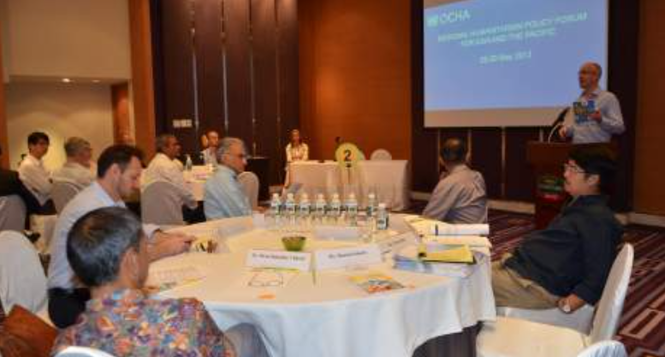
Humanitarian actors at all levels recognise the need for collaborative approaches to meet the demands of the increasingly dynamic and complex humanitarian world. National legal and policy frameworks can provide a strong foundation for bridging cooperation among various actors to address new demands. This was a major theme and a key recommendation of the 2013 Asia Pacific Regional Humanitarian Policy Forum, organised by the United Nations Office for the Coordination of Humanitarian Affairs (OCHA) in Bangkok, Thailand on 28 and 29 May.
Sixty participants from humanitarian agencies, regional organisations, academic institutions, and the private sector gathered to discuss key issues of humanitarian concern, including the management of risk and vulnerability at community level; increasing integration, effectiveness and accountability of international response systems; and innovative solutions to prevailing challenges in disaster relief operations.
The shifting focus of disaster response from international response mechanisms towards domestic actors was a major theme of the forum. Local NGOs, religious organisations, volunteer groups, and the private sector are playing a more active role in responding to disasters and providing vital emergency assistance. With their knowledge and understanding of the local context, these on-the-ground networks provide valuable input and support to relief operations. Globalisation and technological advancements, particularly in social media, are also contributing to this transformation by changing the way people engage and organise themselves. Recognising this shift, international humanitarian assistance needs to be more adaptive, collaborative and transparent.
Law can be an effective tool to ease this shift. This was highlighted by Tessa Kelly, IFRC’s Disaster Law Programme Coordinator for Asia Pacific, who gave a presentation on the importance of legal preparedness during a session on the ‘interoperability’ of national and international systems for humanitarian assistance.
Forum participants agreed that laws can build a more inclusive framework enabling better coordination of relief efforts among the many response actors , and allowing greater control and oversight by domestic responders. This point was also emphasized by Kristen Knutson, Head of OCHA’s Regional Partnerships Unit for Asia and the Pacific, who stated that “strong national legal frameworks are essential for enhancing coordination and preparedness, and can be a key tool to better link the international humanitarian community with national responders.”
Taking into consideration the diverse range of actors involved in disaster relief operations, it is important to establish policies that clearly define responsibilities and ensure accountability, and that guarantee minimum standards in the quality of emergency aid. Legislation can also increase resilience, equipping local authorities and communities with the necessary tools and empowering them to act before, during and after disasters.
The event in Bangkok followed two previous regional fora held last year in South Africa (Southern and Eastern Africa) and Egypt (Middle East and North Africa), and the first Global Policy Forum in New York in 2012. These humanitarian policy fora generate dialogue and identify priorities, building momentum towards the World Humanitarian Summit in 2015.